
"Advertising has lost a lot of territory
to other disciplines. The combination of data
and content creates opportunities
most advertising agencies can’t TAKE. "
THIS IS JORIS VAN ELK.COM






Joris van Elk on agencies
photo by Bas de Graaf

Why?
Having worked in advertising for over 25 years, Joris van Elk has been part of many (inter)national agencies.
As times are changing, so are agencies. One of the main reasons he and André Dammers set up Those Who Can, a flexible alternative and backbone for many new initiatives and agencies.
You’ve worked for international agencies throughout your career. For a few years you have been working as an independent creative. Do you miss working at an agency?
Sometimes I do. Working at an agency means you become part of a second family. And you are much more involved with the bigger picture. But working for agencies has its advantages too. No more politics, no more boredom, no more routine. Still, I do understand a lot of creatives who start their own agency after a period of freelancing--although I do doubt that these agencies will survive the great shake-out.
What do you mean?
Advertising has lost a lot of territory to other disciplines. The combination of data and content creates opportunities most advertising agencies can’t take. So they start exposing their creativity in other ways: free work for charity or cases that show their technical capabilities. With this work, they hunt for awards to get noticed and become more attractive to creative talent. But that’s a farce. You start losing credibility with your clients, and more of the business will be shared with others. A lot of agencies need to make the switch to live up to the demands of our clients, without losing their own DNA. And that’s not an easy goal. It takes time and money. And unfortunately, that’s what most new agencies don’t have.
Most network agencies do have money and time; still they are losing a lot of business too. How come?
These network agencies need to live up to the expectations of the shareholders. And these expectations are always profit-driven. There is a lot of activity when it comes to experimenting with data and content, but it isn’t their core business. If most of these agencies invested half of the money they spend on award shows in the marriage of data and creativity, they would eventually do a lot better. Publicis has invested all of their award show money in Marcel, their Artificial Intelligence-driven platform. A brilliant step, although a bit too radical, for the real creative talent needs to either be satisfied with the ability to win awards or take these exciting times to the next level and join the really progressive startup units. I think a proper balance will be a lot more successful, though only time will tell.
Wouldn’t you want to be part of that type of new agency?
Those Who Can is already exploring these kinds of territories. We look at it from a different angle and try to create a different type of ‘new’ agency, based on the power of flexibility and a quality network. As the world of communication is heading towards some sort of revolution, all avenues are open. Perhaps we can make a difference by offering something different.
But if Those Who Can is a new kind of agency, doesn’t that conflict with the interests of your regular clients, the regular advertising agencies?
No, it does not. We see ourselves as the backbone of all kinds of new initiatives. Whether it’s collaborating with front offices like Ludwig or working for in-house agencies like KPN kreatie, we can offer expertise that is needed by all. So the front office may take any shape, for we as a back office will operate flexibly, like we have always done for the regular advertising agencies. So to be honest, in a certain sense, nothing much has changed. As long as we can go the extra mile, we will work for whoever needs us.
E: mail@jorisvanelk.com M: +31 (0)6 21 54 82 46
© 2022 jorisvanelk.com